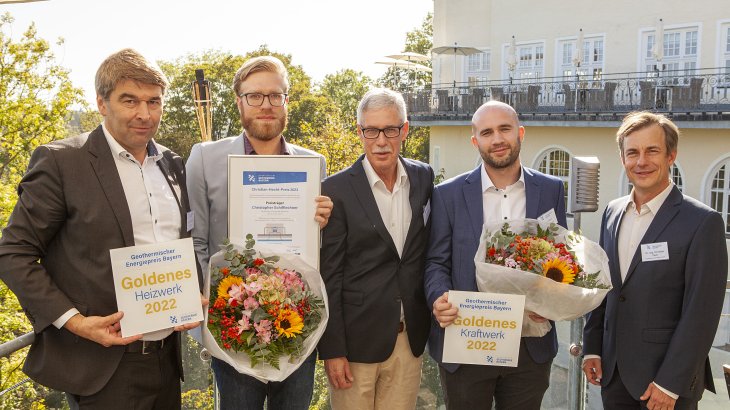
Geothermal projects and research awarded
The “Golden Power Plant” award was received this year by Geothermie Traunreut, which also won this award back in 2020. Meanwhile, the Garching geothermal heating plant was recognized as the most efficient geothermal heating system.
The award ceremony was introduced by Jörg Uhde from Stadtwerke Speyer: “It is always a wonderful task to announce good news. I’m impressed by the great numbers. We are on the right track with geothermal energy and don’t have to hide.”
The Christian Hecht Prize honors scientific research projects by students and doctoral candidates who make a significant contribution to the geothermal use of the Bavarian Molasse Basin or Upper Rhine Graben. This year Christopher Schifflechner won the award. His work “Efficient and flexible geothermal systems for the joint provision of electricity, heat and cold” was created as part of his doctorate at the Technical University of Munich (TUM).
“The excellent work analyzes the diverse possibilities for using geothermal heat. In the work, various operating strategies are compared and optimized,” said Dr. Christian Pletl from Stadtwerke München, which supports the Christian Hecht Prize.
Impressive geothermal performance in Bavaria
For the sixth time, Enerchange GmbH & Co. KG, as the organizer of the Praxisforum Geothermie.Bayern, presented the operating data of Bavarian geothermal energy plants.
“Every year we are thrilled by the overall performance of the Bavarian geothermal systems when we evaluate the data,” stated Managing Director Dr. Jochen Schneider. “Both the amounts of energy generated and the reliability of energy production are impressive. And the large number of new projects gives us hope that geothermal energy will play an even more important role in the heat transition in the future – in Bavaria and nationwide. In total, we have an installed capacity of 300 MW in Bavaria – that’s probably worth a round of applause.”
The evaluation of the operator data showed an average availability of the geothermal heating systems in Bavaria in the surveyed period of 95.7%. The geothermal systems reliably feed the district heating networks in their communities and supply households, businesses and agriculture with climate-friendly heat. The highest amount of heat generated by a single heating plant in 2022 was 156,260 MWh. Extrapolated, the Bavarian geothermal systems produced over 1.5 TWh of district heating.
In addition, there is geothermal electricity generation. In total, the six Bavarian geothermal power plants produced an impressive 145,506 MWh climate-friendly electricity. They also had very high availability, with one system even running for 8,586 hours – out of a total of 8,760 hours in a year.
In addition to the availability of the heating or power plant and the amount of energy generated, further criteria for the evaluation were the coefficient of performance (COP), which indicates the ratio of the pump current used and the amount of energy fed in. Here, deep geothermal energy reaches values ??of up to 26.4 – this means that over 25 kWh of heat are generated from one kWh of electrical energy. These are impressive values ??compared to heat pumps, where a COP of 3 to 5 is already considered efficient.
Advancing geothermal in Germany
The award ceremony was opened by Helmut Mangold, Managing Director of Innovative Energie Pullach (IEP). Mangold made it clear what geothermal energy can and must do for the energy transition, but also pointed out that the framework conditions are still disadvantageous for geothermal energy – from the EU agreement RED III to electricity price caps that compete with geothermal energy.
His appeal to the parliamentary state secretary of the Federal Ministry for Economic Affairs and Climate Protection BMWK was: “How do we ensure that the energy source under our feet, which could supply large parts of Germany with heat in the long term and economically, is finally tackled on an industrial scale?”
State Secretary Stefan Wenzel explained that the great potential of geothermal energy has not been exploited in recent years as much as would be hoped. However, the BMWK has established key points to advance geothermal energy, such as the exploration funding programs or the federal funding for efficient heating networks (BEW). The BMWK wants to work closely with the industry to see what needs to be improved in the legal framework and what further financial support is needed.
“In order to make the heat supply in existing buildings, in new buildings and for industrial processes climate-neutral by 2045, efficiency measures and the massive expansion of renewable energies are necessary,” said State Secretary Wenzel MdB. “Geothermal energy is particularly important in the heating market. Bavaria in particular has excellent geothermal potential and many years of experience in the use of hydrothermal geothermal energy.”
Due to his parliamentary obligations, the State Secretary was unable to be present in person and was connected online.